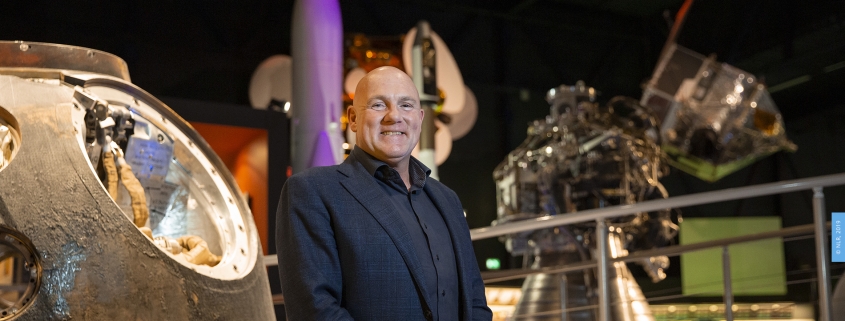During the DELTA mission in 2004 and the PROMISS mission in 2011-2012, Royal NLR was closely involved in the research activities of André Kuipers on board the International Space Station, ISS. In 2004, the physics experiments ARGES and HEAT were supported by NLR from the ground support station in Noordwijk. The ARGES experiment successfully produced results for the production process of light bulbs. During the PROMISS mission, which lasted 193 days, a number of experiments carried out by André Kuipers were supervised from the ERASMUS USOC (User Support Operations Center) at ESTEC in Noordwijk. On instructions from ESA/ESTEC and supported by the NSO (Netherlands Space Office), NLR was responsible for the management and execution of those experiments, in particular the ones in the European Drawer Rack (EDR).
There is no planet B
Retaining biodiversity and ecosystems and sustainability are subjects that André regularly speaks about. “The Earth is amazingly beautiful and I love nature. That’s why I’ve also become an ambassador for the World Wide Fund for Nature. They showed me the figures and it’s much worse than I thought: everything that’s going extinct, what we’re losing and how quickly it’s happening. The Earth’s not getting a chance to recover. Even so, coming across young people now with brilliant ideas makes me optimistic. We can do things more smartly and efficiently. It’s very difficult to bring so many improvements together, but on the other hand I think that nobody used to talk about green electricity, electric cars or bioproducts – and look at us now! I also believe in new technology, not in regression. I don’t believe in stopping flying, but I do believe in cleaner planes.”
Human activities can be observed from space, which is both splendid and disturbing; everything from human structures such as the Afsluitdijk and the Palm Islands in Dubai through to light or air pollution. André himself felt the ‘overview effect’ that many astronauts experience. “Then you look down from space at that wonderful, colourful Earth and it seems to be shrinking away against the black universe. As if it’s a living cell with just a thin membrane, and then you realise it’s all there is. If we blow it, we have nowhere to go. There is no planet B. We may be able to get a handful of people walking around on Mars, but that’s not the solution for humanity.”
“The Earth’s not getting a chance to recover. Even so, coming across young people now with brilliant ideas makes me optimistic.”
Space travel in the future
Kuipers: “I always say that there will be people on Mars in twenty-five years’ time. The thing is, I’ve been saying that for twenty-five years now. Which doesn’t help much – but I never say never. The technology keeps developing and no matter how it progresses, I expect that increasing numbers of companies will be involved in space. A lot of it is already commercial anyway. Think of the weather forecasts that the KNMI issues, going to MeteoSat who build a new satellite and then go hunting for a company that can launch it, such as Arianespace. Market forces already, in other words. That’s what you’ll soon have with manned spaceflight too. There are ideas for building commercial space station, Axiom. Boeing, SpaceX and Orbital are taking cargo to the ISS; the first two will soon be taking people as well.”
André also says that we will be going back to the Moon. Last year, NASA presented its plans for astronauts to make longer stays on and around the Moon. The aim is to study the Moon further and make preparations for voyages to Mars. “That will be an international station called Gateway. There’s still a lot for us to study about the Moon, and we can also put amazing telescopes there and maybe energy devices. I expect that we’ll look at space increasingly for energy purposes and for mining raw materials. There are splendid ideas for going mining in the asteroids.”
What interests André most at the personal level is whether there is life elsewhere. “I’d love to see evidence of that. Whether it’s found on Mars, on one of the gas giants’ icy moons or analysed from the light of exoplanets – it’s something I’m still hoping to see.”
That one brilliant idea
It is important that young people are given room, according to André. The scope to try things, with a free hand. “I’m always uncomfortable with the fact that money only becomes available for research if you say what the results are going to be. Whereas a lot of discoveries come from fundamental research, discoveries that were unexpected. So give young people plenty of freedom, because they can think outside the box. And you just don’t know who’s going to have that one brilliant idea…”
The annual International Astronautical Congress (IAC 2019) will be held in Washington at the end of October. Royal NLR will be represented in the Holland Pavilion, together with 8 other companies from the aerospace sector and the Netherlands Space Office (NSO). André Kuipers will also be there with the Spacebuzz.

